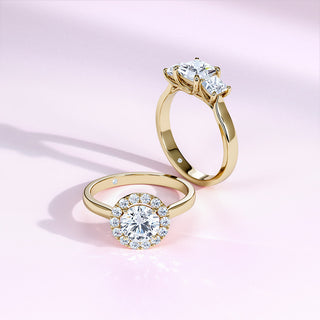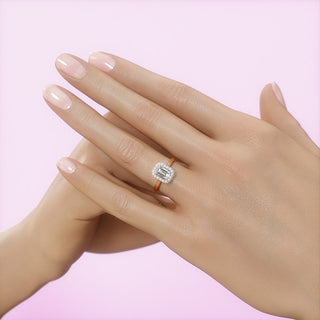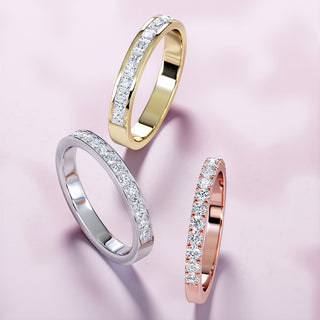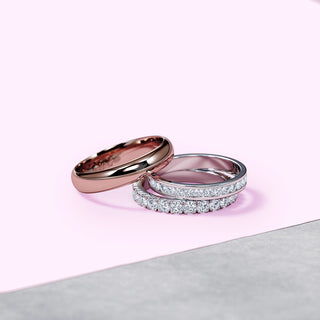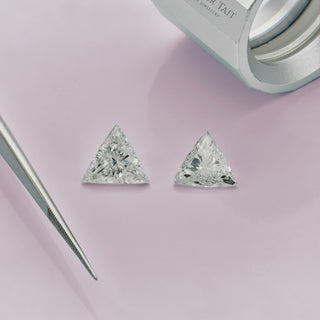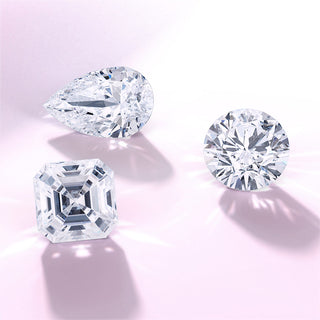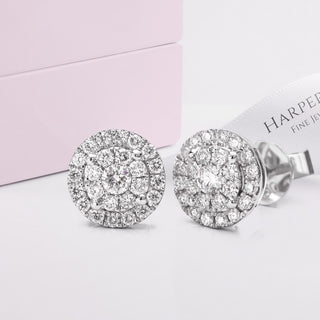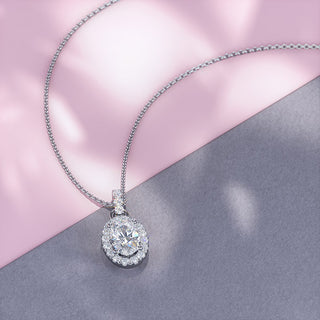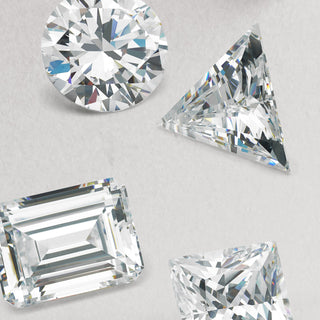Platinum is a hugely popular choice for engagement and wedding rings , thanks to its beautiful white shade and famous durability.
Bridal and wedding jewellery is usually made of gold or platinum, the two most precious and durable metals used in jewellery. Engagement rings and wedding bands are worn every day, so must be hard-wearing and hypoallergenic. Platinum is both.
But durability doesn’t mean your platinum ring is going to look brand new forever. Platinum will scratch, which can come as a surprise for some people. On the Mohs scale of hardness, platinum has a rating of 4 to 4.5, meaning it can be scratched by any material harder than itself, such as diamonds, which are rated 10. Here we look at how durable platinum really is, and why it is such a good option for everyday jewellery.
Platinum is a brilliantly durable precious metal. First, platinum is extremely dense - much more so than gold or silver. If you hold a platinum ring in one hand and the exact same ring made in gold in the other, the higher weight of platinum will be noticeable. Pure gold, being softer, is often alloyed to create white gold , which affects its color and durability.
This density gives platinum greater strength and resistance to wear and tear than other precious metals. But this isn’t the only thing that makes it so durable. Platinum is highly resistant to corrosion, which means it won’t tarnish with exposure to water to air. Platinum is easy to wear and look after, day after day. As a naturally white metal, platinum does not need to be rhodium plated. It will remain the same colour without any upkeep. Read our platinum metal guide .
You’ll find engagement and wedding rings are crafted in platinum more often than pieces such as earrings , necklaces and bracelets. Rings naturally get more wear and tear; they are in contact with everything that we touch throughout the day. Durable platinum is perfect for this.
Other types of jewellery are knocked and marked less, so there’s less need for them to be made from a very durable material. Platinum’s density makes it comparatively heavier than gold for the same style – and often, this means an increase in price. For lifestyle jewellery, increased durability isn’t necessarily enough to justify a higher cost.

What is platinum?
Platinum is a rare and naturally occurring precious metal, highly prized for its durability, rarity, and versatility. As a member of the platinum group of elements, it shares its family with palladium, rhodium, ruthenium, osmium, and iridium. This dense, malleable, and ductile metal boasts a stunning silver-white colour and is renowned for its resistance to corrosion. With a high melting point, platinum is not only ideal for crafting exquisite jewellery but also finds extensive use in catalytic converters and various industrial applications.
Why does my platinum ring look dull?
This is where hardness comes in. The Mohs scale is an official measure of hardness, which measures a mineral’s ability to resist (or impart) scratching. Platinum has a hardness of 4.5, lower than diamonds (10), sapphire (9) and even opal (5.5).
So as the scale shows us, many other materials can scratch platinum. This means that over time, platinum jewelry scratches and develops small scuffs from everyday wear. Despite its durability, you should not expect platinum to look perfectly polished forever.
Gold and platinum scratch in two different ways. When gold is scratched, microscopic amounts of gold are left on whatever material scratched it - a tiny bit of the gold is removed with each scratch. Scratches on gold tend to be shallow, and the ring overall still looks quite shiny.
When platinum is scratched, it behaves a little differently. Platinum is both softer and denser than gold. So while it yields more to the scratch, resulting in a deeper mark, it also doesn’t lose any metal. The platinum is just displaced around the scratch. Over time, micro-scratches and dents will make the surface of platinum look dull.
The good news is, platinum is easily polished. Thanks to displacement no platinum has been lost, and your ring can be confidently polished back to an as-new finish!
This is why it is important to wear metals of the same type next to one another, to avoid uneven wear. Platinum is harder than gold, so a platinum engagement ring rubbing against a gold wedding ring could cause the latter to wear faster.
The metal you choose for your engagement and wedding jewellery is personal. If you love distinctive, cool-toned platinum, this beautiful and durable metal could be your perfect choice. And with our Lifetime Aftercare your platinum repolishing is on us.
Explore our platinum engagement rings and wedding rings to discover your forever piece.
Why choose platinum engagement rings
Platinum engagement rings are highly sought after for their exceptional durability, rarity, and luxurious appeal. Couples often choose platinum for their special day due to the metal’s unique properties and numerous benefits. Here are some reasons why platinum engagement rings are so popular:
Durability : Platinum is incredibly durable, capable of withstanding the wear and tear of everyday life. Its resistance to scratches, corrosion, and damage makes it an ideal choice for engagement rings.
Rarity : As a rare metal, platinum holds significant value and exclusivity. This rarity adds a touch of luxury and prestige to platinum engagement rings.
Aesthetic Appeal : Platinum’s unique silver-white colour is highly prized for its beauty and elegance. It pairs beautifully with diamonds and other precious stones, creating stunning and sophisticated designs.
Symbolism : Platinum is often associated with luxury, sophistication, and commitment, making it a meaningful choice for engagement rings.
Platinum is an ideal metal for creating stunning and long-lasting engagement rings.

Platinum rings from Harper Tait
We understand the importance of finding a ring that is personal to you. Our mission is to craft engagement rings that tell the story of your love, from the sentiment to the style.
We're here to help. Reach out to us on info@harpertait.com and we’ll help you navigate the process with ease! Or, explore our range of platinum engagement rings and platinum wedding rings.
What Our Customers Think
"I went to Paul at Harper Tait to buy an engagement ring in early 2022 and what can I say, the service was unbelievable from start to finish. I think what really makes the service second-to-none is that not only is Paul an incredibly friendly and knowledgeable guy, he never made me feel in a rush and was never pushy at all, which having spoken to a few other jewellers felt like the norm. The ring is absolutely stunning and the turnaround times were super quick, delivering a completely bespoke ring within 6 weeks of ordering. If you're looking for a jeweller you'll return to time and time again, look no further - we'll certainly be back for the wedding rings!"
Does platinum scratch or dent easily?
Like all precious metals, platinum will scratch. However, it is more resistant to scratching than gold or silver, so it’s a great choice for those concerned about durability. It's important to note that platinum jewelry scratches can still occur, as all metals are susceptible to scratching. Different alloys of platinum can have varying degrees of hardness, which affects their scratch resistance.
Can you remove scratches from platinum?
Absolutely - removing platinum jewellery scratches is possible with a polish, which we offer for free as part of your Lifetime Aftercare promise. While many consumers associate durability with scratch resistance, it's important to note that all metals, including platinum, are susceptible to scratching. Different alloys can have varying degrees of hardness, which affects their scratch resistance. Very deep damage may need repair, but we will assess your piece and let you know if this is required.
Can platinum be worn every day?
Yes! In fact, its durability and hypoallergenic properties make platinum an ideal choice for an everyday piece. Platinum jewellery is known for its exceptional durability and resistance to scratching, ensuring it retains its integrity over time.
Is platinum better than silver?
Silver is lighter and far more affordable than platinum, so for lifestyle jewellery or large pieces, silver may be the preferred choice.
However, silver is easily scratched and damaged. Over time, silver will develop a black patina known as tarnish which needs to be cleaned. Platinum jewellery does not tarnish, and is a more lasting material. This makes platinum more appropriate for every day and heirloom jewellery.
In comparison, white gold requires rhodium plating to maintain its white color and can develop a yellow hue over time. While platinum is naturally white and hypoallergenic, white gold needs more maintenance and is less durable.


